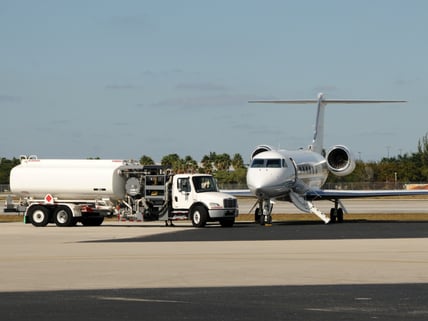
It wasn’t so long ago that two thirty-somethings stood on a beach near Kitty Hawk, North Carolina, witnessing the first powered flight in the history of the world. The year was 1903: Wilbur Wright was airborne for roughly three seconds. A century later, homo-sapiens have been transformed from a species incapable of flight to one that has walked on the moon--it’s hard to imagine so much innovation in only a few generations.
Unfortunately, nothing comes without a price.
One hundred years of flight and development have made the world a smaller place, but it has also brought about a problem the Wright brothers couldn’t have foreseen: the amount of CO2 emissions. According to the European Commission, the world’s aviation emissions account for 2% of total global emissions.
Scientists, airline companies, and environmental entrepreneurs are working together to find both long- and short-term solutions to these emission problems. One particularly promising solution is sustainable aviation jet fuel (SAF), which offers a way to reduce carbon emissions without sacrificing speed or power.
What is SAF? It’s traditional jet fuel mixed with sustainable, non-fossil fuel. SAF is often produced from renewable crops like corn or grain. SAF doesn’t necessarily need to be a biofuel (fuels exclusively produced from plant or animal resources), although the terms are often used interchangeably. The non-fossil fuel is blended with traditional jet fuel, resulting in a fuel that burns cleaner and emits up to 80 percent less CO2.
Currently, there are five types of sustainable fuels that have been approved to be blended with traditional jet fuel. They’re made from materials including algae, sugars, fatty acids, oil residue, municipal waste, and agricultural waste. Some of these fuels can be blended 50/50 with conventional jet fuel — not bad, especially considering most gasoline is blended with only 15 percent ethanol. As new engines and technology come into use, the percentage of sustainable fuel used is expected to grow, eventually reaching 100 percent and eliminating the need for fossil jet fuel entirely.
But replacing traditional jet fuel with SAF isn’t the aviation industry’s only goal; sustainability is great, but it’s not enough. If food crops like corn and sugar are used to create fuel, people could go hungry. Or, if sustainable material is unethically sourced, it could cause more harm than good for the environment. That’s why so many in the airline industry are committed to finding safe ways to produce SAF without relying on edible crops, subbing materials like used cooking oil, or agricultural waste. United Airlines, for example, invested $30 million in Fulcrum BioEnergy, an American company that produces fuel out of household garbage. Not only is Fulcrum creating clean energy, but they’re also reducing the size of American landfills.
Fulcrum isn’t the only company working on innovative fuel solutions. In Abu Dhabi, Boeing, and Etihad Airways are working together to grow succulents. Able to grow in brackish water, the succulents produce oil seeds that can be turned into biofuel. Meanwhile, in Illinois, LanzaTech is producing fuel from waste gas. By taking existing carbon and repurposing it into fuel, LanzaTech says it could make 30 billion gallons of ethanol annually—just from steel production waste gases.
Though SAF has been around for only a decade, it has successfully reduced CO2 emissions for airline companies around the globe. In 2008, Virgin Atlantic flew a 747 Boeing from London to Amsterdam using SAF in one engine. By 2017, there were more than 100,000 flights that operated with help from SAF, with expectations of hitting 1 million flights by 2020. The International Air Transport Association hopes that 1 billion passengers will have experienced a SAF-blend flight by 2025.
Airlines around the world are committed to cutting carbon emissions, with many investing in SAF by forward-purchasing billions of gallons of fuel. Already, airports in Stockholm, Los Angeles, Oslo, Bergen, and Brisbane consistently stock SAF, while other airports are beginning to offer it sporadically. If you’re a frequent flyer, you may have already journeyed through the sky with help from SAF fuel, without even knowing it.
As more members of the aviation industry join the commitment to sustainable fuel, SAF will become more and more prevalent. Gulfstream Aerospace, a manufacturer out of Savannah, Georgia, has been advocating for sustainable fuel for years. They have been testing SAF with company-operated aircraft since 2011, finally making it available to their customers in California in the spring of 2019.
SAS, the Scandinavian airline, is even letting customers get in on the action. When purchasing a ticket, passengers have the option to “buy biofuel” at checkout. The price is fixed at $10 and won’t necessarily go to the flight the traveler flies on, but it is a real, tangible way for globetrotters to add their support to the SAF movement.
Royal Dutch Airlines KLM is another loud voice in support of a sustainable future. Tired of waiting for an adequate supply of SAF, the company decided to build its own fuel production plant in the Netherlands. Upon its completion in 2022, the plant will be the first of its kind in the world. But it doesn’t stop there: KLM’s latest marketing slogan, “Fly Responsibly,” goes so far as to encourage passengers to think twice before flying, suggesting they take the train instead.
With the aviation industry on board, sustainable fuel has a chance to take off. SAF might not be the final solution to the problem of flight emissions, but it is certainly a step in the right direction. As long as companies like SAS, KLM, and Gulfstream continue to lead the industry in forward thinking and consumers continue to demand more responsibility from big business, the future of fuel is looking up.
Interested in learning more about our line of FloTech™ or ADS products? Explore dixonvalve.com, or talk to a specialist at 877.582.3569.
Sources:
- https://ec.europa.eu/clima/policies/transport/aviation_en
- https://aviationbenefits.org/media/166152/beginners-guide-to-saf_web.pdf
- https://aviationbenefits.org/environmental-efficiency/climate-action/sustainable-aviation-fuel/producing-sustainable-aviation-fuel/
- http://fulcrum-bioenergy.com/
- https://www.iea.org/newsroom/news/2019/march/are-aviation-biofuels-ready-for-take-off.html
- https://www.forbes.com/sites/jeffmcmahon/2019/01/24/the-7-most-promising-biofuels-for-airlines/#36eccc7e174d
- https://www.greenbiz.com/article/heres-what-it-will-take-get-aviation-biofuels-ground
- https://www.lanzatech.com/
- https://www.ainonline.com/aviation-news/business-aviation/2019-08-15/gulfstream-gets-kudos-use-and-promotion-biofuels
- https://www.flightglobal.com/news/articles/sas-offers-passengers-option-to-purchase-biofuel-460920/
- https://fortune.com/longform/green-sustainable-klm-royal-dutch-airlines-100/


